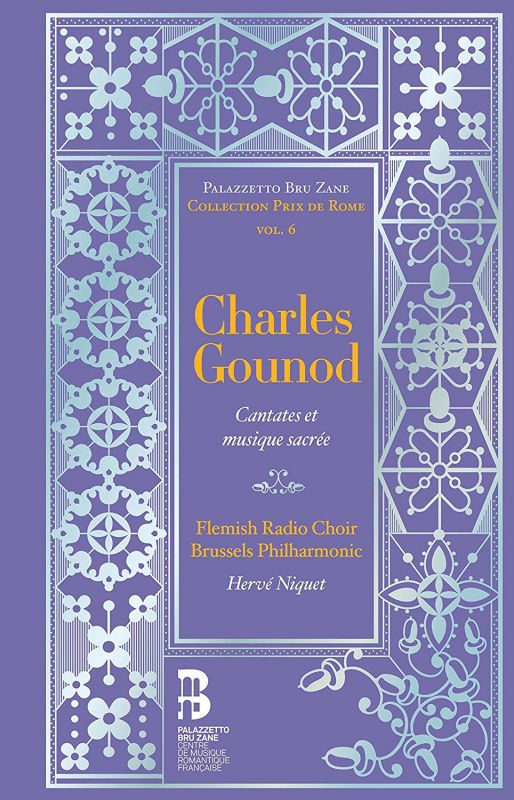GOUNOD Cantatas and Sacred Music
View record and artist detailsRecord and Artist Details
Composer or Director: Charles-François Gounod
Genre:
Vocal
Label: Ediciones Singulares
Magazine Review Date: 04/2018
Media Format: CD or Download
Media Runtime: 129
Mastering:
DDD
Catalogue Number: ES1030

Tracks:
| Composition | Artist Credit |
|---|---|
| Marie Stuart et Rizzio |
Charles-François Gounod, Composer
Brussels Philharmonic Orchestra Charles-François Gounod, Composer Gabrielle Philiponet, Soprano Hervé Niquet, Conductor Sébastien Droy, Tenor |
| Fernand |
Charles-François Gounod, Composer
Brussels Philharmonic Orchestra Charles-François Gounod, Composer Hervé Niquet, Conductor Judith Van Wanroij, Soprano Nicolas Courjal, Bass Yu Shao, Tenor |
| La Vendetta |
Charles-François Gounod, Composer
Brussels Philharmonic Orchestra Chantal Santon-Jeffery, Soprano Charles-François Gounod, Composer Hervé Niquet, Conductor Yu Shao, Tenor |
| Messe vocale pour la fête de l’Annonciation |
Charles-François Gounod, Composer
Charles-François Gounod, Composer Flemish Radio Choir |
| Christus factus est |
Charles-François Gounod, Composer
Brussels Philharmonic Orchestra Charles-François Gounod, Composer Hervé Niquet, Conductor Judith Van Wanroij, Soprano |
| Hymne sacrée |
Charles-François Gounod, Composer
Alexandre Duhamel, Bass Artavazd Sargsyan, Tenor Brussels Philharmonic Orchestra Caroline Meng, Mezzo soprano Charles-François Gounod, Composer Flemish Radio Choir François Saint-Yves, Organ Hervé Niquet, Conductor Judith Van Wanroij, Soprano |
| Messe de Saint-Louis-des-Français |
Charles-François Gounod, Composer
Artavazd Sargsyan, Tenor Brussels Philharmonic Orchestra Caroline Meng, Mezzo soprano Charles-François Gounod, Composer Flemish Radio Choir Hervé Niquet, Conductor |
Author: Tim Ashley
Success did indeed come, it would seem, at the cost of reining in his enthusiasm and originality. The first disc presents us with his second-round dramatic cantatas, written to prescribed texts. Gounod won with Fernand, an Orientalist three-hander set during the siege of Granada, in which a Spanish nobleman risks both life and honour to reunite Zelmire, the Muslim girl he adores, with Alamir, her lover in the enemy ranks. Elegant and attractively orchestrated, it is by no means negligible, but seems cautious, harmonically and melodically, when placed beside its more adventurous predecessors. Marie Stuart et Rizzio (1837) is very much a young hothead’s work – a real roller coaster of a piece, emotionally confrontative and characterised by an almost Berliozian recklessness of harmony and expression. La Vendetta (1838), set on Corsica and depicting a mother swearing her son to avenge his murdered father, is more introverted: the tension and oppressive mood are unwaveringly sustained, though the Meyerbeerian closing duet is a bit stiff.
Gounod initially found Rome disappointing: ‘Provincial, ordinary, colourless and dirty almost everywhere’, he wrote. But his encounter with the city’s church music, Palestrina in particular, fired his imagination. The second disc surveys his sacred works composed in Rome itself and in Vienna, where be briefly lived after his studies were complete. His Mass for Rome’s French church, Saint-Louis-des-Français, strongly prefigures the St Cecilia Mass of 1855, in which Gounod reused some of its material. The real revelation here, though, is the unaccompanied Messe vocale of 1843, which shows how much he learned from Palestrina without becoming imitative. Each section is preceded by a chorale setting of a versicle associated with the Virgin Mary, which then becomes a cantus firmus in the movement proper. The polyphony is exquisite, and the overall effect is one of timelessness rather than archaism. It is a most beautiful work.
As with the previous volumes, Hervé Niquet conducts the Brussels Philharmonic and Flemish Radio Choir in performances that are for the most part exemplary. There are minor cavils over some of the soloists: tenor Artavazd Sargsyan is pushed in his upper register in some of the sacred works; in La Vendetta, Chantal Santon-Jeffrey and Yu Shao sound too close in age to be mother and son. But there are fine things elsewhere: Gabrielle Philiponet and Sébastien Droy are gripping as Mary Stuart and Rizzio; Judith Van Wanroij mesmerises and touches as Zelmire in Fernand, and also gets to sing the ravishing motet Christus factus est, written in Vienna late in 1842. The choral singing has wonderful richness, clarity and fervour, above all in the Messe vocale, which is breathtaking. A tremendous set, it adds immeasurably to our understanding of Gounod’s work. Very highly recommended indeed.
Explore the world’s largest classical music catalogue on Apple Music Classical.
Included with an Apple Music subscription. Download now.

Gramophone Digital Club
- Digital Edition
- Digital Archive
- Reviews Database
- Events & Offers
From £9.20 / month
Subscribe
Gramophone Club
- Print Edition
- Digital Edition
- Digital Archive
- Reviews Database
- Events & Offers
From £11.45 / month
Subscribe
If you are a library, university or other organisation that would be interested in an institutional subscription to Gramophone please click here for further information.






